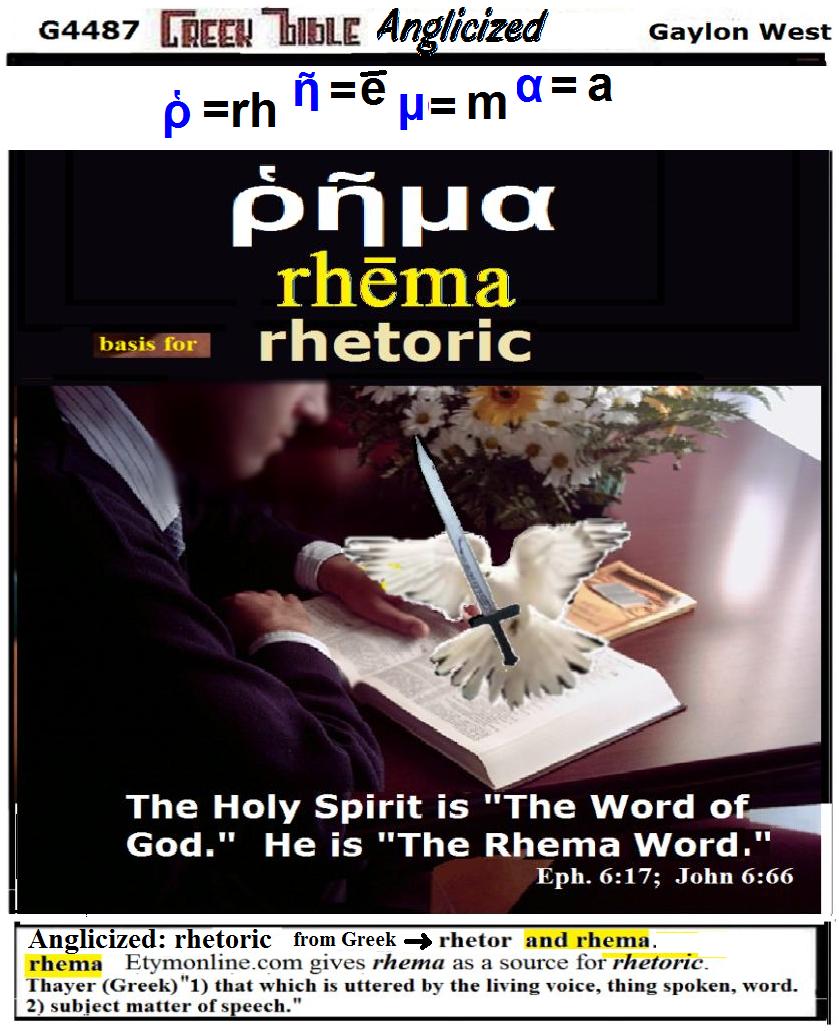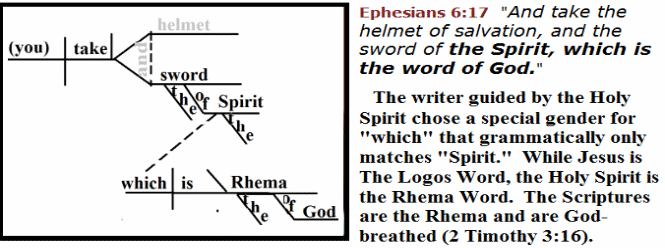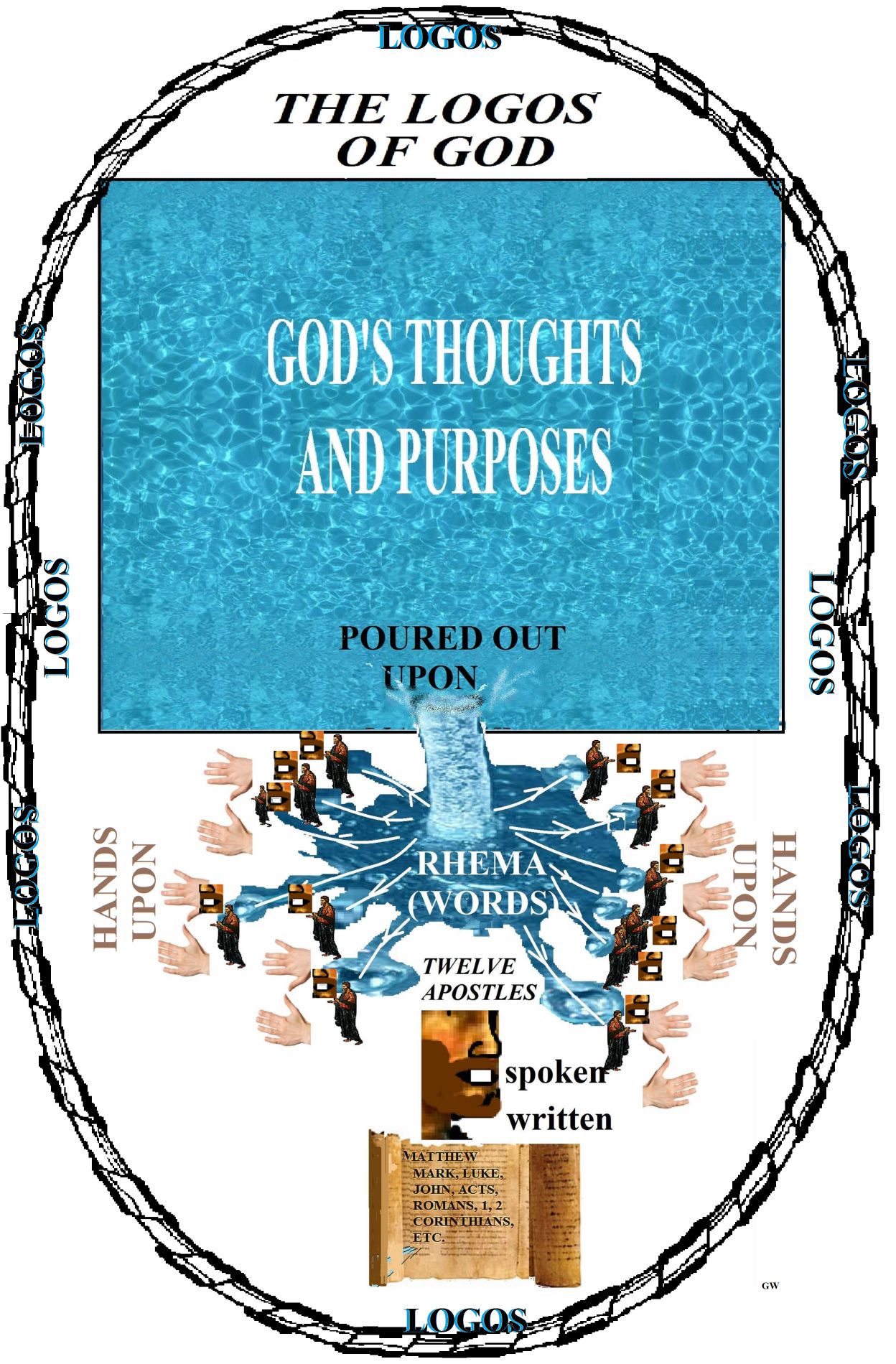
THE HOLY SPIRIT IS THE WORD OF GOD ALSO

Generally, people identify Jesus as “the Word of God.” John 1:1 does declare Jesus to be “The Word of God”; i.e., “the Logos” in the original language. But people are not aware that the Holy Spirit is declared also to be the “Word of God” (Ephesians 6:17; John 6:66). But the word in the original is different; He is “the Rhema of God.” There’s a difference in the two words, logos and rhema, and in their meanings.

LOGOS for contrast
A pocket Greek lexicon defines logos as “speech in progress: a word, an utterance, speech, discourse, a saying.”i Thayer defines logos specifically as speech that would include all the aforementioned but adds its use also as respect to the MIND alone: reason, consideration, reckoning. Vincent’s Word Studies sums it up as “both the outward form by which the inward thought is expressed, and the inward thought itself ” (on John 1:1).
The word logos appears 325 times in the KJV as “word(s)”, “saying(s)”, “account”, “speech”, “matter”, “utterance”, “thing(s)”, “communication(s)”, “reason”, “work”, “cause”, “concerning”, “do”, “doctrine”, “fame”, “intent”, “mouth”, “move”, “preaching”, “question”, “reckoneth”, “rumour”, “say”, “show”, “speaker”, “talk”, “tidings”, “treatise”. In other words, should we not be able to say that logos is the total thought process? Surely, Jesus is the total thinking process of God (Hebrews 1:1-4).
RHEMA
According to Strong's Concordance (#G4487), the word translated word, rhema, means “an utterance (individually, collectively or specifically) on a particular matter or topic.” Thayer's Greek Definitions defines the word as something that has been uttered, in either the past or the present, by a living entity.
The word rhema occurs at least 70 times in the New Testament Greek text. The books that use it the most are the gospel of Luke (19 times), followed by the book of Acts (14 times), then the gospel of John (12 times). In the King James Bible, the Greek word Rhema is many times translated as "word(s)" (Matthew 4:4, 18:16, Mark 14:72, etc.). It is also translated as "saying(s)" (Mark 9:32, Luke 1:65, etc.) and "thing(s)" (Luke 2:19; Acts 5:32; Luke 2:15). Also, it is “evil” in Matthew 5:11 and “nothing” in Luke 1:37.
THE ENGLISH WORD “RHETORIC”--root, “that which is spoken (or written)” [see chart]
Merriam-Webster Dictionary (online): Definition of rhetoric “ 1 :the art of speaking or writing effectively: such as a :the study of principles and rules of composition formulated by critics of ancient times b :the study of writing or speaking as a means of communication or persuasion 2 a :skill in the effective use of speech b :a type or mode of language or speech; also :insincere or grandiloquent language 3 :verbal communication :discourse
“RHETORIC”*--early 14c., from Old French rethorique, from Latin rhetorice, from Greek rhetorike techne "art of an orator," from rhetor (genitive rhetoros) "speaker, orator, teacher of rhetoric," related to rhesis"speech," rhema "word, phrase, verb," literally "that which is spoken," from PIE *wre-tor-, from root *were- (3) "to speak" (source also of Old English word, Latin verbum, Greek eirein "to say." *FROM ETYMONLINE.COM.z
RHEMA: “THAT WHICH IS SPOKEN (EXPRESSED)”.
The first time rhema is used in the New Testament is during Jesus' forty-day temptation by Satan. Jesus, after being tempted to feed himself through a miracle after fasting for a long period, responds with the following:
"It is written, 'Man shall not live by bread alone, but by every word (rhema) that proceeds out of the mouth of God’" (Matthew 4:4, HBFV). [spoken word]
Its second appearance in the New Testament occurs in Matthew 12 when some religious leaders accuse the Lord of casting out demons by the power of Satan himself. He warns them that God will hold humans accountable for every idle (lazy, useless) word (Rhema) that is spoken (verses: 24, 36).ii [spoken word]
Rhema as used in the New Testament then as:
(a) a spoken word, an utterance, the concrete expression of logos;
(b) a subject as spoken about, a subject of speech, a matter, a thing, a fact (Matthew 18:16, Luke 1:37, 2:15, etc.);
(c) in a solemn sense, of a divine word, Luke 3:2, Ephesians 6:17, etc.;
(d) the gospel, 1 Peter 1:25; Ephesians 5:26iii "And this is the word [rhema] which by the gospel is preached unto you" (1 Peter 1:25).
Examples:
Matthew 18:16 “But if he will not hear thee, then take with thee one or two more, that in the mouth of two or three witnesses every word [rhema] may be established.” [spoken word]
Luke 1:37 “For with God nothing [ rhema ] shall be impossible.” [no thing]
Luke 2:17 “And when they had seen it, they made known abroad the saying [rhema] which was told them concerning this child.” [spoken word]
Luke 3:2 “Annas and Caiaphas being the high priests, the word [rhema] of God came unto John the son of Zacharias in the wilderness.” [spoken word]
1 Peter 1:25 “But the word [rhema] of the Lord endureth forever. And this is the word [rhema] which by the gospel is preached unto you.” [spoken and expressed word]
Romans 10:8ff “But what saith it? The word [rhema]is nigh thee, even in thy mouth, and in thy heart: that is, the word [rhema ]of [the] faith, which we preach; [spoken/expressed word; "the faith delivered"- Jude 3 ]
Ephesians 5:26, “ That he might sanctify and cleanse it with the washing of water by the word, [rhema].” [spoken or revealed word]
Ephesians 6:17. And take the helmet of salvation, and the sword of the Spirit, which is the word [rhema] of God: [The Holy Spirit is the Spoken (and hence), Expressed/Revealed Word?]
FALSE TEACHING ABOUT RHEMA
A confusing use of “rhema” in the religious world today is a claim that the Holy Spirit's leads in one's life as the "rhema word." This is not grammatically accurate. The word rhema as used in the Greek language can be used of any saying by any person. Its use in the Bible was not limited to Jesus or to an inward spiritual message. When one uses only such in referring to the Spirit's leading in a person's life, it is technically not an accurate use of the word! A more balanced understanding of God's "word" would include testing what a person believes he or she has been led to do by God's Spirit by the teachings of God's Word as revealed in the New Testament (2 Timothy 3:16,17). As A. T. Robinson (Word Pictures) remarks about Jesus' rhema being "Spirit" and "Life", "The breath of God [i.e., His Spirit] and the life of God is in these words of Jesus. Never man spoke like Jesus (John 7:46). There is life in his words today." And I would add in conclusion that there's God's Spirit also. iv

We have determined that God’s Logos includes God’s thoughts and revelation while God’s rhema includes the revelation; i.e., all His revealed spoken and written words. The rhema was revealed by the Spirit of God through Jesus' appointed twelves apostles and the prophets whom the apostles lay their hands upon (Acts 1, 2, 8, 19).
“My thoughts are not your thoughts” (Isaiah 55:8). “The secret things belong unto the Lord our God: but those things which are revealed belong unto us and to our children forever, that we may do all the words of this law” (Deuteronomy 29:29).
The righteousness of God is revealed in the gospel of the New Testament” (Romans 1:16, 17).
The rhema (Word) of God is distributed first to the apostles (Acts 2:1ff) and then to those selected prophets whom the apostles lay their hands (Acts 8:14-19; 19:1-5; Ephesians 3:1-8).
The Holy Spirit is therefore God’s Thoughts As Expressed or Spoken (or Written). “ALL SCRIPTURE IS ELOHIM-SPIRITED” (2 Timothy 3:16a, ERRB). The Holy Spirit (God’s Rhema) is to be preached (even as the apostles did on Pentecost, Acts 2:14 and to Cornelius, Acts 10:22), and consequently be received and obeyed in total as the revelation of the Logos by all of us (Acts 2:41, 42).
GAYLON WEST
Throw Out The Lifeline
i Souter, A. A Pocket Lexicon To The Greek New Testament.
ii Adapted. http://www.biblestudy.org/beginner/definition-of-christian-terms/rhema.html
iii Adapted from Pocket Lexicon Greek New Testament.

|